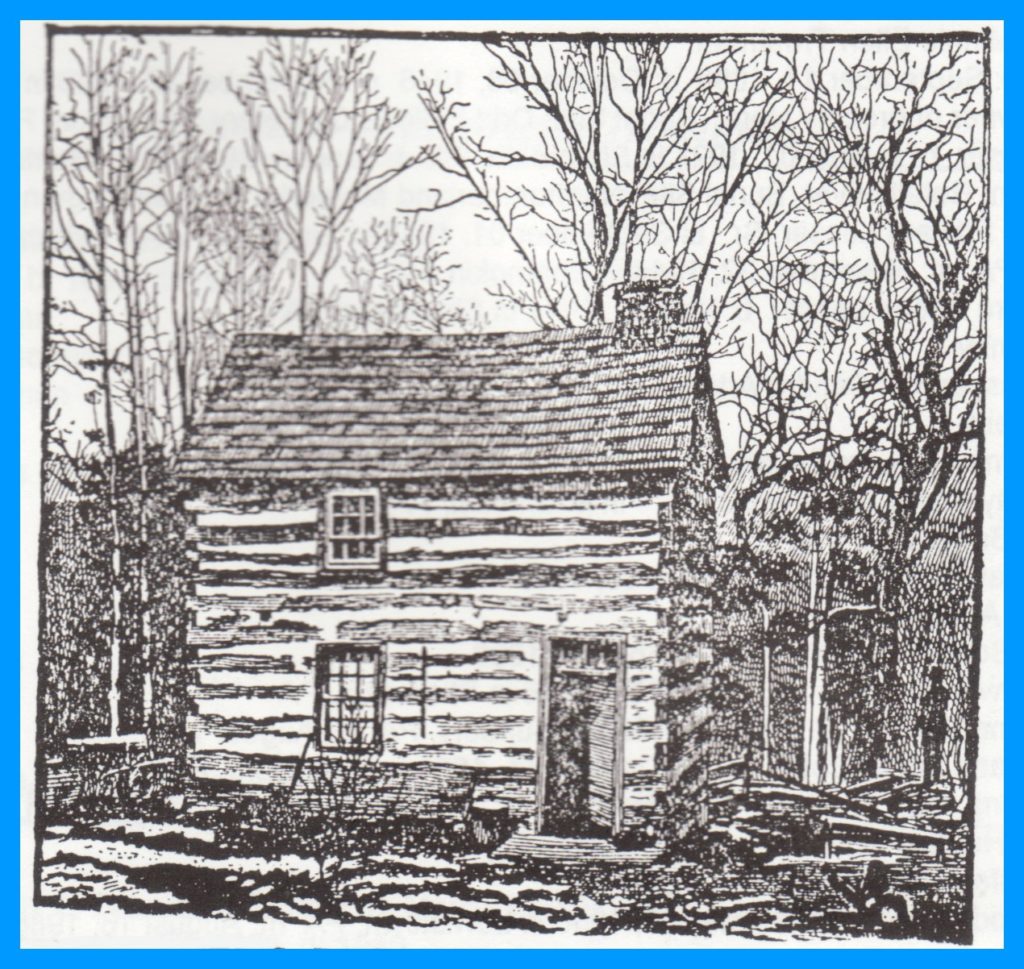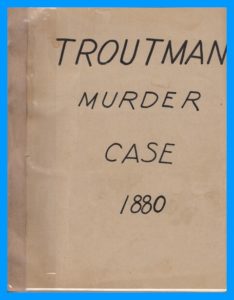Prior to 1997, a Troutman descendant, Allen Troutman, reflected on the murder of Daniel Troutman in November 1880 and the trials of the perpetrators that took place in Dauphin County Court: Henry Romberger and Frank Romberger, sometimes spelled “Rumberger.”
The above wood-cut depicts the Daniel Troutman home, which was located in an area of Lykens Township, Dauphin County, Pennsylvania, known as “Spain.” The closest community to the Troutman home was Pillow, then known as Uniontown.
The source of the wood-cut is not known.
Here follows the story told by Allen Troutman, which varies in minor detail from the reporting that appeared in the newspapers:
_________________________________
THE TROUTMAN MURDER
Lykens Township has been relatively free of violent crimes. But one incident took place in the last century, that is even today the subject of some conversation among residents of the area. Part of the interest can be attributed to a book that was written on the subject….
The victim of this particular crime was Daniel Troutman, a respectable, well-to-do farmer living with his wife and children between the Mahantongo Mountain and the creek of the same name. This area is often referred to as “Spain.”
Mr. Troutman had fathered seventeen children, fifteen of whom lived to adulthood. Some were still living at home at the time of the crime. Mr. Troutman’s father-in-law, Jacob Bush had recently died, and Daniel acting as executor of his estate, had conducted a public sale of the goods that weekend. Since there had been no opportunity to deposit the proceeds of the sale in the bank, he had concealed it in a blanket on his wagon. Some people were aware that he had the money.
Daniel, his wife and the two youngest children retired early on the evening of November 14, 1880. Some of the older children had gone to singing school not far distant. Shortly after retiring, Mrs. Troutman hear a noise that was unfamiliar. She awakened Mr. Troutman and presently they were aware of two men standing by their bed with pistols in hand. Mr. Troutman and presently they were aware of two men standing by their bed with pistols in hand. Mr. Troutman, although 68 years old, was a man of great courage. He raised up in bed and asked, “What do you want?” “We want that money,” was the reply. Daniel told them it was not there. “Yes it is, we know you have the money from the Bush sale, and if you don’t turn it over to us, we will kill you,” one of the men said. To that Mr. Troutman replied, “All right,” and getting out of bed, partly dressing, he walked over to a window. He reached up to a rafter in the ceiling as if to get the money, But instead he got down his double barreled shot gun.
Unnerved by this unexpected display of courage, the intruders took to their heels with Troutman in pursuit. Outside, one ran to the right, the other to the left. Troutman shot at the latter, who managed to throw himself over a stone fence in time to avoid being hit. At the same time, the burglar on the right fired at Troutman, hitting him in the chest. Apparently Mrs. Troutman’s screams caused the burglars to flee. They also brought help from a near by neighbor named Gise. They did what they could for the stricken man, but wound was mortal, and he presently expired. With his last breath, Mr. Troutman said, “Henry Rumberger shot me.”
Mr. Gise mounted a horse and rode to Uniontown (now Pillow) and contacted Justice J. A. Laudenslager who issued a warrant for Rumberger’s arrest and gave it to David Willier who was the constable. Willier assembled a posse of six men and went in search of the alleged murderer. They rode to the Troutman residence and after assisting the family in every way they could, they started in search of Rumberger. After scouring the countryside all night, they came upon Rumberger on horse back. He was arrested and taken to Justice Laudenslager, where he vehemently denied any knowledge of the crime. His alibi was that he had been at his mother’s house at the time of the killing. His mother lived twenty miles distant from the scene of the crime. However, on the strength of Troutman’s dying statement, Rumberger was taken to Harrisburg on Monday evening. When interrogated on Tuesday, he admitted that he was involved in the murder but insisted that he did not fire the fatal shot. He said the shooting was done by his companion, James Rumberger, a cousin.
This man was employed at the Lykens mine. Willier visited the mine and found that Rumberger was working the night shift. At midnight when the suspect emerged from the mine, he was taken into custody. He also denied the charges and gave as an alibi that he was in the company of a married woman (Mrs. Graeff), of Wiconisco at the time in question. When Mrs. Graeff was questioned she confirmed his statement. Mr. Willier again went to Harrisburg and interviewed Henry Rumberger for the second time. Henry gave the same statement as before, but for some unknown reason said it was FRANK Rumberger, not James. (It was the same person). Mr. WIllier returned to Lykens and again arrested Rumberger committing him to Dauphin County Prison. After further questioning, both admitted to their part in the murder.
At the trial, Henry testified against Frank. Judge Pearson charged the jury who returned a verdict of guilty of first degree murder, after deliberation for three and one half hours. Counsel for he defense made a motion for a new trial on the grounds that the Judge erred in charging the jury. The judge reviewed the court stenographer’s notes and found that he indeed made a mistake and granted the new trial.
It was now almost a year since the murder and the accused elected to be tried separately. Henry was tried first and jury’s verdict was again guilty of first degree murder. Frank was then tried , and the evidence against him was even more damaging than at the first trial because Mrs. Graeff retracted her statement saying Frank had paid her to give him an alibi. The death sentence was pronounced on both men. Governor Hoyt issued execution warrants and set March 24, 1882 as the day of the hangings at 9 o’clock in the morning. A large crowd gathered at the prison. In those days anyone could wangle a pass to watch executions. An estimated three hundred persons were in the year including some of Troutman’s sons and relatives.
The prisoners were awakened at six A.M. and offered breakfast. Henry accepted. Frank declined. Henry seemed calm and complacent, but Frank was visibly shaken and came close to breaking down. He closed his eyes that morning and kept them closed tightly as long as anyone could notice. He had to be carried up the steps to the gallows. Mercifully his neck was broken in the drop, while Henry choked to death. Neither said a single word, although Henry’s lips were seen to move to the words of the hymn the spiritual escort was singing. The parents claimed the body.
_________________________________
The “book” referred to here in the opening paragraphs is entitled The Troutman Murder Case of 1880: Life and Confession of Frank H. Rumberger, One of the Troutman Murderers, published in 1882 by a Harrisburg newspaper. The book was a compilation of articles published in the newspaper.
The Allen Troutman reflection and the wood-cut were published in a Troutman family history in 1997, with permission in advance given to re-publish.
Corrections and additional information should be added as comments to this post.

